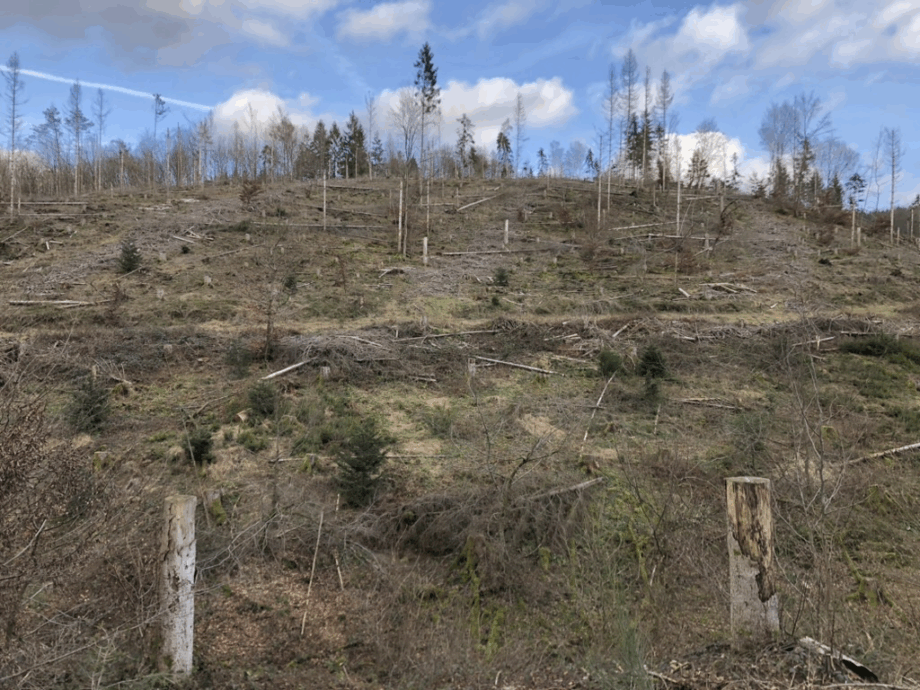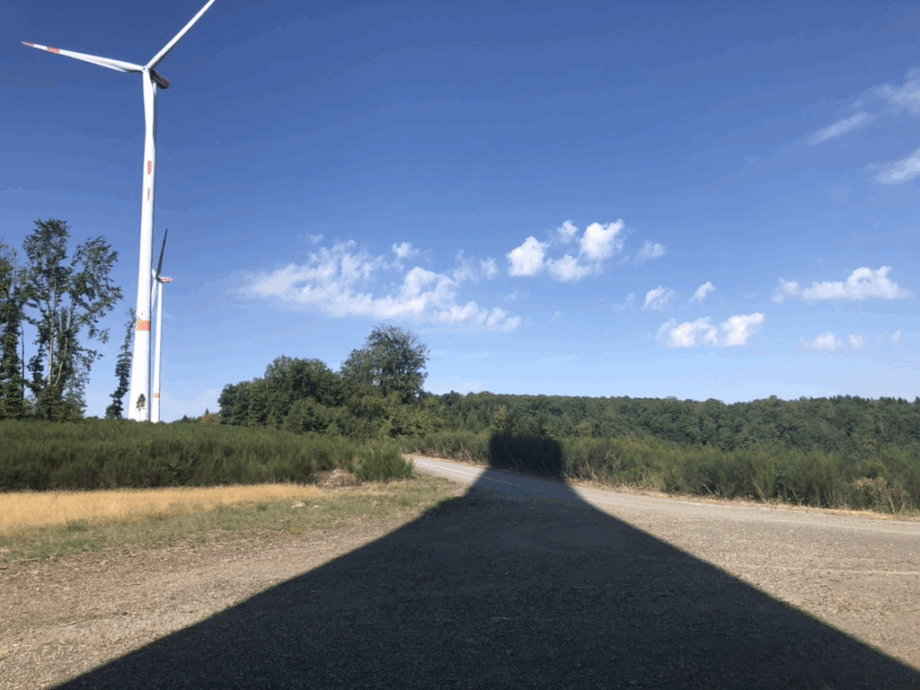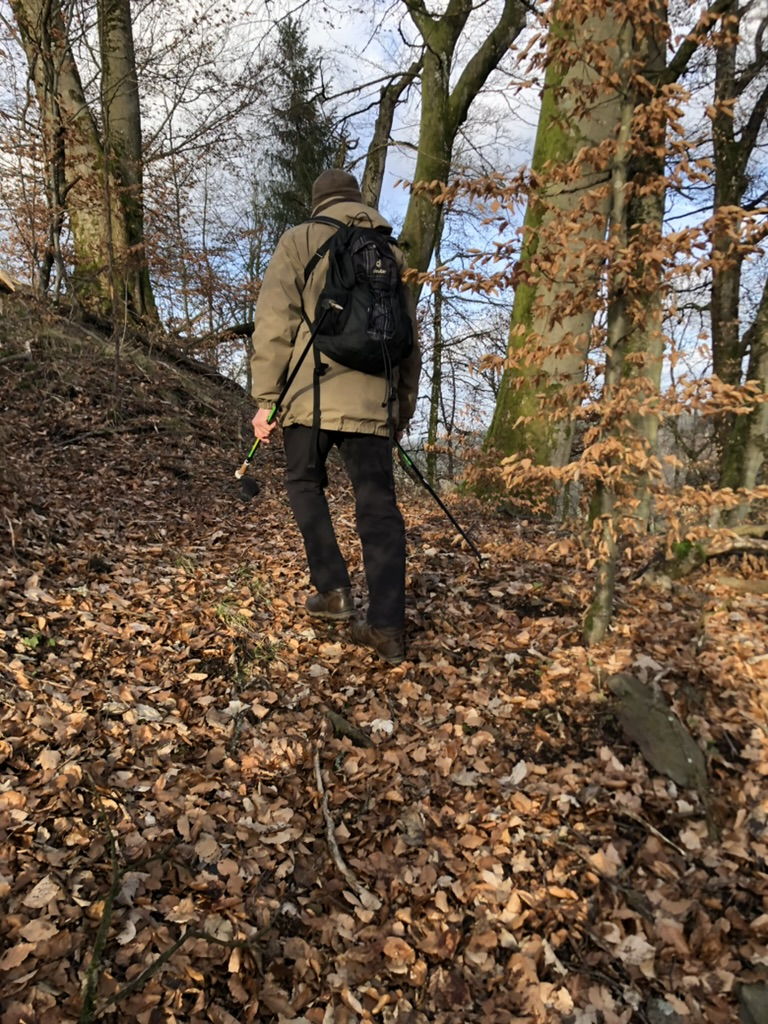Co-Productive Research in Contested Fields
Challenges and Chances
It is January 2022; a chilly wind blows through the forest in the northern part of Rhineland-Palatinate in Germany. To be frank, “forest” is an exaggeration and mischaracterization—what appears before my eyes are skeletons of former spruce plantations whose fate was determined by a bark beetle outbreak triggered by severe periods of drought in the years before. I am walking through the local landscape with Georg, one of my closest research partners with whom I have started to interact a few months before. Georg is in his mid-60s, grew up in a comparatively remote rural area in the western part of Germany, and has been engaged in nature conservation since his youth. He is a biology teacher and very committed to the protection of red kites and black storks in his home region. As we look at this ghostly, apocalyptic scenery, Georg explains to me that conservation of the environment is not synonymous with climate protection. In his view, the contemporary public debate in Germany on the various anthropocenic crises is more or less restricted to climate protection, while nature or biodiversity conservation receives less than its fair share of public and political attention. Georg points to a ridge where several wind turbines are likely to be built in the coming years and explains that he sees himself as a wind power critic but not as a strict opponent. He is critical of the often voiced argument of climate activists that climate protection is equivalent to biodiversity conservation, arguing that it fails to take into account that the extension of wind power in forest areas jeopardizes conventional nature conservation efforts.

Former spruce forest (Rhineland-Palatinate, Germany). Copyright: Mario Krämer.
This short vignette gives a brief insight into the research I am conducting with nature conservationists who are opposed to wind power extension in rural regions of Western Germany. In terms of the key interest of this boasblog, one question that has preoccupied me for a while is whether I am “co-producing knowledge” at all. I conduct ethnographic fieldwork in a politically contested research field with interlocutors who often have a decidedly different normative background and political views than myself and the academic milieu of anthropologists I am part of. I thus ponder whether to co-produce knowledge is possible and worth striving for in my research. Put differently, does co-producing knowledge presuppose that our research partners are sympathetic to us and that we share fundamental values and political interests? Or are there also ways and means of co-producing knowledge with the “normative other” (Krämer and Zenker 2024), that is, research partners with whom we disagree normatively on fundamental political matters in general and on the numerous crises humanity and non-human beings face in these insecure times in particular?
In what follows, I elaborate on aspects of co-producing knowledge in anthropological research. The focus is on co-productive processes in politically contested research fields which raise various challenges but also offer specific chances. In other words, the key objective of this blogpost is to discuss the transformative potential and pitfalls of co-productive research.
Since about four years, I have collaborated with nature conservationists in the western part of Germany who are opposed to wind power extension in rural areas. My focus is on a rural area in the low-mountain regions of Rhineland-Palatinate, which for the most part has been a landscape protection area since 1968. I conduct fieldwork with a citizens’ action group that is opposed to wind power extension in the region and several of whose members describe themselves as nature conservationists. I have expanded my research site in the meantime and have started to work with representatives of other citizens’ action groups in the wider region as well as conducting interviews with nature conservationists in other areas of Germany.
Most of my interlocutors are more than fifty years old, were born or have lived since several decades in the region, and typically come from a middle-class background, including some academics (mostly with a degree in the natural sciences). Interestingly, quite a number supported the Green Party (Bündnis 90 / Die Grünen) in the past and pinned their hopes on the party’s commitment to nature conservation, which were dashed in their perception. My focus is therefore not on people living in rural areas or nature conservationists per se, but rather on a specific milieu of rural actors who are committed to the original, “traditionalist” idea of nature conservation that can be traced back to the late nineteenth century in Germany with a focus on preserving “nature” and “the landscape” (see Krämer 2024).
The citizens’ action group was established in 2015 when one of the founders became aware that a wind power company planned to build fifteen wind turbines near the local villages. The group was able to prevent the building of the wind turbines for many years, but a decision by a Higher Court in 2023 cleared the way for their construction, which is about to start soon. Two ornithologists in the group register the existence and movements of endangered species in the area, such as the red kite, black stork, and different kinds of bats. Together they compile detailed annual reports on the occurrence of endangered species in the projected wind turbine areas—reports that were key to preventing the construction of wind turbines until recently.
In the low-mountain regions of central Germany, wind turbines are often constructed in forests today. German federal states have different regulations on the necessary distance between a wind turbine and a settlement, which is why wind power companies avoid building wind turbines close to villages or small towns in order to avert delays by court action. Forest areas that are situated at a sufficient distance to human settlements are thus the preferential sites for the construction of new wind turbines. Another key criterion is the wind potential, which differs substantially across the low-mountain regions. The newest wind turbines are more than 250 metres high and their construction in forests requires deforesting a site of about 0.8 hectares per turbine, sealing the surface with concrete, and constructing access roads through the forests. In this way, forests and non-human species are noticeably affected by the extension of renewable energy sources, and nature conservationists claim that these effects are insufficiently dealt with in public and academic debate.

Wind turbines in the forest (Rhineland-Palatinate, Germany). Copyright: Mario Krämer.
What are my personal and professional motivations for engaging in this research? In the context of (arguably) increasing political polarization and the deepening of normative divides in the Global North broadly and in Germany specifically, my research is inspired by what I perceive as a key anthropological endeavor: a better understanding of the viewpoints and interests of research partners with whom we disagree normatively on fundamental political questions. Second, and beyond this academic endeavor, my research aims at searching for some kind of common ground in addressing both imminent anthropocenic crises—the climate as well as biodiversity crisis—rather than playing one off against the other as is often done in academic as well as socio-political debates. This is precisely what I communicate to potential interlocutors when I introduce my research. Therefore, my intention is to have an edifying conversation with my interlocutors, to learn from them (and hopefully also the other way round), and to understand what people think and how they act.
One particular method in establishing rapport with the nature conservationists is what I name “collaborative walking.” By this I mean joint walks and hikes with my interlocutors during which I learn a great deal about ornithology, forestry, and nature conservation as well as about their own worldviews and normative backgrounds. Originally, I applied collaborative walking as a stopgap due to the COVID-19 pandemic and its limitations in conducting participant observation and interviews, but soon I learned to appreciate the edifying and productive aspects of collaborative walks. Lee and Ingold (2006, 83) argue that walking can be a practice of understanding and that the shared bodily engagement and the joint rhythm of walking could be a resonant experience that establishes a common ground between research partners. The argument is that the shared rhythm of movement enables a common understanding in a holistic manner, whereas face-to-face interaction (as, for example, in interviewing) tends to be confrontational rather than companionable. The shared view of the landscape facilitates an empathetic understanding of one another and, at least for this specific period of interaction, normative differences fade into the background and a resonant conversation across political divides becomes possible.

Walking through the forests. Copyright: Mario Krämer.
For example, the edifying and resonant aspects of the collaborative walking approach became apparent in a joint day’s hike involving representatives of the citizens’ action group and students in my master’s course in social anthropology in June 2022. Together with my research partners we organized an excursion and the students and me travelled to the home region of the citizens’ action group, where we joined three representatives of the group in a four-hour hike. My research partners took us to different sites in the landscape that they perceived as particularly relevant for their concerns. We were told and we talked about the local landscape and nature, urban-rural relations, renewable energies, and the opposition to the planned wind turbines. Although the political and normative views of both groups, particularly their perspectives on what is due in terms of the various anthropocenic crises, differed considerably, the shared assessment at the end of the day was that both parties had gained unexpected insights from each other, giving both groups pause for thought. In other words, our collective walk facilitated, first, a temporary dialogue across political divides and, second, a self-reflection of one’s own political certainties. The collaborative walk with the nature conservationists, moreover, had an academic impact, since some of the Master students decided to write their master’s theses on related topics and methodological questions.
iii.
However, co-producing knowledge in general and the collaborative walking approach in particular come with various challenges. First, since I am working in a politically contested research field and with people whose normative viewpoints I partly do not share, my research means walking and stumbling not only in nature (physically) but also in difficult political terrain (symbolically). For example, at the beginnings of my research I felt that my interlocutors underrated the consequences of climate change and restricted their attention to nature conservation. I constantly felt uncomfortable about it and initially decided to listen rather than to engage in heated discussions. This assessment of mine has somewhat changed over time, and the collaborative walks especially helped me to experience and to better understand my interlocutors’ viewpoints. Co-producing knowledge, therefore, means to make these perspectives and the underlying assumptions of what is due in terms of human-environment relations more comprehensible and visible through, for example, academic publications and other contributions to public debates such as blogposts. In doing so, I address a frequently voiced complaint by my research partners that they are supposedly allocated to the “complicated and right-wing slot” when voicing their criticisms of or opposition to wind power. In contrast to this co-producing perspective, the “first wave” of social acceptance research on renewable energies (see Batel 2020) generally aimed to improve knowledge about such opposition in order to manage it, rather than to learn from it. In other words, academic knowledge which focuses more on control than on conversation is likely to be incompatible with the endeavor of co-production.
Second, and deriving from this, another challenge is to balance giving sufficient space for the nature conservationists’ viewpoints with maintaining an autonomous stance as a researcher. When I introduced myself and my research ideas to the representatives of the citizens’ action group a few years ago, I made clear (at least from my understanding) that I do not see myself as an activist researcher who will promote the interests of the group, but that I would like to establish a conversation with them and to learn about their perspectives on the various anthropocenic crises. In a public meeting a few months later, however, the speaker of the group showed a presentation which claimed that I did research for (and not with) the citizens’ action group—which was then also reported by a journalist in a local newspaper. I felt uncomfortable with being “taken over” by the group for their interests and insisted on my normative and political autonomy as a researcher. In my interpretation, the citizens’ action group was struggling at that time to maintain the support they were able to gain in the first years of their existence and my research was perceived by the speaker as a welcome contribution to revitalize the opposition against the planned wind turbines. From the perspective of research partners, then, co-producing with “academic others” might be a strategy for achieving specific political goals.
To address these and other challenges of co-productive research, two aspects are crucial from my viewpoint: First, we should co-produce a conversation by sharing our presence and thus trying to establish or uphold dialogue across normative and political divides. Second, however, we also have to take a stand and safeguard our autonomy as researchers from being influenced or instrumentalized for certain goals we (normatively and/or politically) do not share. In other words, “empathetic scepticism” should be our guiding principle, that is, attempting to understand how people think and act on the basis of their own experiences with similar situations while at the same time systematically questioning all knowledge claims (Krämer and Zenker 2024).
iv.
In conclusion, co-productive research and collaborative walking as a specific practice of empathetic understanding have a transformative potential despite the discussed challenges. Taking others seriously in joint walks and thus showing a willingness to learn from our research partners stimulates necessary yet controversial debates across normative divides in times of escalating anthropocenic and political crises. What I have learned, among other things, in co-productive research so far is that the frequently voiced argument and accusation of “NIMBYism” (acronym for “Not In My BackYard”, that is, the supposed opportunistic rejection of infrastructure projects “in our own backyards”) in order to explain the opposition to wind power is too simplistic. The people with whom I interact rather put forward normatively grounded arguments that motivate them to oppose wind power. Against the background of imminent ecological crises, they focus on the preservation of the non-human environment and cultural landscapes and express their opposition to wind power in at least three different and partly overlapping ways (see Krämer 2024): as a commitment to nature conservation and species protection; as a concern for the aesthetic and affective values of local and regional landscapes; and as a plea for the reduction of energy consumption and a degrowth paradigm.
References
Batel, Susana. 2020. “Research on the Social Acceptance of Renewable Energy Technologies: Past, Present and Future.” Energy Research & Social Science 68 (101544). https://doi.org/10.1016/j.erss.2020.101544
Krämer, Mario. 2024. “Nature Conservation and Opposition to Wind Power in Rural Germany: Divergent Views on (In)Justice and Environmental Crises in the Anthropocene.” In “Justice in the Anthropocene,” edited by Olaf Zenker and Anna-Lena Wolf. Special Issue, Zeitschrift für Ethnologie / Journal of Social and Cultural Anthropology 149 (2): 277–96. https://doi.org/10.60827/zfe/jsca.v149i2.1925
Krämer, Mario, and Olaf Zenker. 2024. “Mis/Trust, Empathy/Sympathy and the Un/Likeable Other: Towards Empathetic Scepticism and Agonistic Confrontation in Anthropological Knowledge-Making.” Paper presented at The Politics of (Post-)Truth: Knowledge-Making in Fragmented Worlds of Mis/Trust Workshop, Johannes Gutenberg-Universität Mainz, July 10-11, 2024.
Lee, Jo, and Timothy Ingold. 2006. “Fieldwork on Foot: Perceiving, Routing, Socializing.” In Locating the Field: Space, Place and Context in Anthropology, edited by Simon Coleman and Peter Collins. Routledge.
Mario Krämer is Professor of Social and Cultural Anthropology at the University of Cologne and a principal investigator of the DFG-funded Research Unit “Transborder Mobility and Institutional Dynamics” (FOR 5183). His main fields of research are political and environmental anthropology and he has conducted long-term ethnographic fieldwork in Southern Africa and Europe. One of his current research projects deals with the nexus of environmentalism, traditionalism and rural-urban relations in contemporary Germany with a focus on nature conservation and opposition to wind power.































